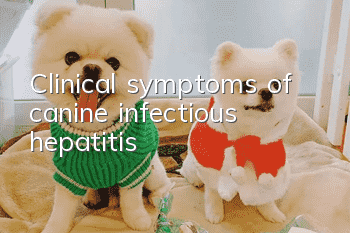Clinical symptoms of canine infectious hepatitis

Clinical symptoms of canine infectious hepatitis:
1. Acute: The affected dog is afraid of cold, has low body temperature, is depressed, has no appetite, especially wants to drink water, and has abdominal pain. Wrinkling, vomiting, diarrhea, vomiting bloody gastric juices, and passing bloody jam-like stools.
2. Subacute: The symptoms are corneal edema, blepharospasm, blindness and serous eye secretions.
3. Chronic: mild fever, varying appetite, constipation and diarrhea, and poor mental state.
Treatment methods for canine infectious hepatitis:
1. Infectious hepatitis hyperimmune serum can be used for treatment in the early stage of the disease, but once obvious clinical symptoms appear, even if Large doses of hyperimmune serum are also unlikely to have a therapeutic effect.
2. Blood transfusion therapy can be used to a certain extent in cases of severe anemia.
3. Symptomatic treatment, intravenous glucose replenishment, fluid replenishment and adenosine triphosphate. Coenzyme A plays a certain role in the recovery of this disease.
4. Systemic application of antibiotics and sulfa drugs can prevent secondary infection.
5. Dogs suffering from keratitis can use 0.5% lidocaine and chloramphenicol eye drops alternately.
- Causes and care for dogs with blood in their stools
- What can’t Pekingese dogs eat?
- Urine analysis and clinical significance of dogs and cats
- Are German Shepherds easy to care for? How to raise a German Shepherd?
- Why is my dog’s nose not moist?
- Is it normal for dogs not to eat much in summer?
- Maltese dog intelligence
- Dogs eat dog food less actively than before
- Three major tumors in dog oral cavity
- Can a dog tear down a house?



